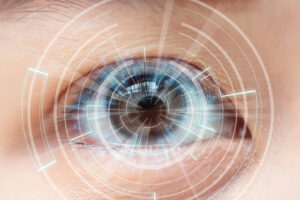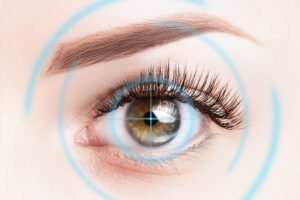
It may be hard to believe that the first concept for contact lenses was thought of more than 500 years ago by the genius inventor Leonardo Da Vinci. Since those first sketches, the technology has come a long way in the contact industry. From hard to soft contacts to ones that help correct astigmatism, contact lenses have truly changed the way people can enjoy their lives.
Before contacts, glasses made some activities difficult to take part in, which can truly hinder an active lifestyle. One of the most remarkable advances made to the contact lens is their ability to cater to those individuals that have presbyopia.
What is presbyopia?
Presbyopia is the condition that makes it difficult to focus on objects that are up close and it usually results from aging. When you focus on objects at different distances, your lens needs to be flexible in order to contract or expand properly, to help focus the incoming light on the retina.
When we age, our lenses naturally lose their elasticity and become less flexible, which often results in trouble focusing on objects that are close.
The common solution to this condition is reading glasses or “cheaters” to help individuals read up close material. However, for those who suffer from additional vision problems, bifocal or multifocal lenses in glasses are the solution. These lenses offer different prescriptions within the same lens to correct for different distances.
But, as mentioned above, glasses often present several lifestyle limitations and are not the first choice for many individuals. There are a few solutions to this tricky refractive error that many 40+ individuals experience.

The first solution is to wear contacts that correct the distance vision problem and carry a spare pair of reading classes for the times where near vision is necessary. This is perhaps the simplest option but really offers little, with regards to the inconvenience of always having to bring those “cheaters” in case a situation requires fine print reading or detailed work.
The next option for solving the issue of presbyopia is referred to as monovision. When you choose this solution, it means that you wear one contact that is suited to correct the distance error and the other contact that is prescribed to correct the up close error. This may sound like a headache waiting to happen; that is often true at first because of the adjustment your eyes and brain have to go through with a split vision clarity. However, the brain does an incredible job of adapting and utilizing the monovision system to create clear vision images at all distances.
The final solution that is available for those looking for the freedom of contacts to correct their presbyopia is multifocal contact lenses. How do multifocal contact lenses work? These contacts operate on the same premise as bi- or multifocal glasses, by offering two or more prescription powers to accommodate multiple focal points and allow an individual to see clearly at varying distances.
Thanks to the technology today, multifocal contact lenses have tremendously improved and users find them comfortable and easy to wear. You can ask your eye doctor to explain in more detail just exactly what are multifocal contact lenses.
If you’ve tried all of these solutions, or want to skip to a more reliable one, refractive laser eye surgery may be the right choice for you. Laser eye surgery can solve a variety of vision errors and greatly reduce the need for glasses or contacts.
If an active lifestyle is your goal or you have tried every other option, give us a call today. At Diamond Vision, we understand just how important seeing life clearly is to you and we want to help you take back the convenience in your life. Our staff of award-winning surgeons provide the very best procedures that utilize the latest technologies and techniques, in order to provide exceptional results for our patients. To learn more about how Diamond Vision can help you see clearly again, call us today for your free consultation or visit our Atlanta Laser Eye Surgery Center if you’re from Georgia.
Contact Us
If you have more questions about LASIK procedures, get in touch with us.
Related Blogs

Timing is Everything: When to Consider LASIK After Nursing for Optimal Results
Timing is everything when considering LASIK eye surgery after nursing, and understanding the optimal period for this procedure is vital for both mother and baby.

Cataract Surgery: Restoring Clarity and Confidence
Cataract surgery is a transformative procedure that offers a new lease on clear vision and renewed confidence. As cataracts cloud the eye’s lens, causing blurred

Intralase LASIK Explained: What to Expect Before, During, and After the Procedure
Intralase LASIK is a cutting-edge procedure that offers a safe, effective, and precise way to enhance vision compared to traditional LASIK methods. Understanding what to
